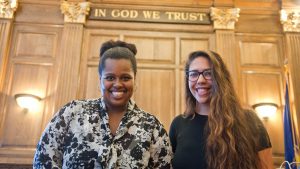This summer I had the pleasure of working with Assistant Political Science Professor Taneisha Means on a project entitled Black in the American Courthouse: Black Judges and Representation in the 21st Century. This on-going project seeks to examine the significance of diversity on the bench—specifically as it applies to black state-level justices.
I needed to dive straight into a number of rich texts which provided a sense of framing for the rest of the summer. During my first week, I worked to familiarize myself with the ideas and definitions introduced by: Black Faces in the Mirror by Katherine Tate, Black Mosaic; The Politics of Black Pan-Ethnic Diversity by Candis Watts-Smith, and Sisters in the Statehouse by Nadia E. Brown. These texts had influenced and informed Means’ initial work on this project, and they inspired me to dig up every syllabus I’ve encountered during my time at Vassar, because I knew I had been introduced to ideas that could further enrich the project as we moved forward. Means made it clear in the beginning that this research process would be a collaborative one, and from the very first days of research she welcomed fresh ideas as well as my voluntary act of checking out nearly 15 books she did not assign.
By the second week we had already begun recreating a new survey instrument and interview questionnaire, and from there several tasks began and were works-in-progress throughout the last six weeks of the program. While the survey and interview questionnaire were still being drafted between the two of us, I began the creation of a database of black judges across the nation. Means had already ran into the issue of locating judges for interview and surveying purposes in the past, so the continual cataloging of judges’ contact information became a big goal for the project. Around this same time I was also tasked with transcribing and analyzing nearly 30 interviews that Means had already conducted.
The mentorship and research opportunity that Professor Means provided for me during this summer completely exceeded all of my expectations for this program. Not only did this project gave me several ideas for a thesis in political science, but it fully rekindled my desire to pursue academia as a career. I am beyond thrilled to be able to continue with this project as Professor Means’ research assistant this fall.

